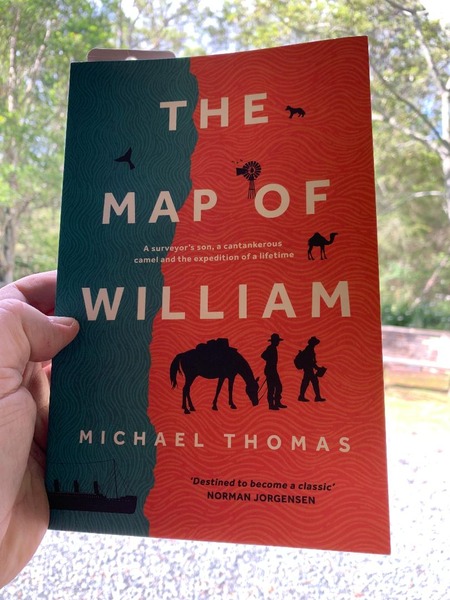(read at Pindari cabin, Yeranda Cottages, Dungog, 2-9 January 2024)
Every one of us reaches at a point at the start of our adult lives where many of the childlike things that defined us fall away or are transformed and we have to reckon with what it means to be grown-up, with all the responsibilities and challenges that entails.
For fifteen-year-old William Watson, that moment comes in mid-1909 when his Welsh father Hywel, a surveyor who is extremely well connected thanks to his work with Western Australia’s (W.A.) elite, takes him on an expedition to map the northwestern portion of the new state – at this point, Australia is only eight years old and W.A. has only just changed from colony to state, albeit with some reluctance – a routine months-long trip meant to map the waterways and other resources needed to facilitate productive use by gold miners and pastoralists.
William, the titular protagonist of The Map of William by Michael Thomas, is a wayward young man of sorts; he never actively gets into trouble but he is distracted at school, too quick to speak and too slow to edit himself when that’s required in a society where speaking your mind comes with considerable caveats – the Watson family are loving and inclusively supportive in a way ahead of their time but there are still expectations that musty be fulfilled – and not entirely sure of who he is or what he wants in life.
His father takes him on the expedition as a way of giving his son additional life experience before he begins works with a Mr Hobbs with whom he will live, and it is hoped that, if nothing else, this journey into a still largely unknown interior – to white men anyway; the traditional custodians of the land know it intimately and not simply for what it can provide materially – will productively use time that William might otherwise squander.
William is at that point in his young life where he’s yet to learn how to interact with other adults in meaningful and thoughtful ways, where what he’s capable of has never been fully tested and where he wants or hopes to have in life from a career to romance and more has been been defined in any sort of way.
This expedition will change all that, and William in quite remarkable ways.
Across the quiet ocean, an orphan moon emerged from behind a bank of clouds. A gentle headwind ruffled my shirt and the shroud of yesterday seemed lighter. And then, from nowhere, I heard a voice whisper on the breeze and caress my salt-sprayed face.
‘And Lord, take care of our William. He is a wayward son whom I love without condition. Guard his soul from troubled thoughts and keep him safe, I pray. Amen.’
It all begins quietly enough with William and his father boarding the SS Doreen May, a ship run with bawdy certainty by Captain Thorn which plies the W.A. coast and then onto England and takes passengers along the way.
A number of the passengers and crew become firm friends along the way including, to William’s astonishment, Captain Thorn who goes from blustering, cantankerous captain to unexpected fatherly friend, and Donal, a man who acts as navigator on the ship and who, like many of the other people on the Doreen May cannot stand the sociopathic arrogance and cruelty of Sergeant Jardine, a man who treated people with contempt and whose thirst for violence and vengeance is seemingly unquenchable.
He becomes the Big Bad of The Map of William, not simply a considerable thorn in the side for an impressionable but quick-learning William whose growth as a person on the expedition and throughout the book is significant, but also as a way for Thorn to masterfully and affectingly demonstrate how much darkness lurks at the heart of the new state of Western Australia and by extension all of colonial Australia.
This is a country of considerable wealth and promise but it is bringing about its exciting new destiny by actively stealing land off those who have treasured and act as good stewards of their country for upwards of 65,000 years, by enslaving and killing them with an official brazenness that is horrifying to behold and by extracting resources from gold to water with little thought to how it will impact the environment or those who act as its custodians.
(courtesy Fremantle Press)
While principally a coming of age story about one young man at the start of a new nation, The Map of William is also a hard, long look at the various kinds of people that make it up, from the officials who turn a blind eye to breaches of the law if it serves their interests to the Indigenous people coerced into building wealth and power for others and to more enlightened people like William, his father Hywel and the others who end up in the found family given communal shape and form by an expedition which us far from business as usual.
As William journeys into the northwestern heart of W.A. and witnesses great kindness and rich humanity but also death, mistreatment of others and raw bigotry, he comes to understand that he has a choice to make – he can either turn a blind eye to the terrible things he witnesses – unthinkable able with a father of great integrity and a mother, Louisa, who is a constant, Godly voice inside his young head – or he can actively stand against them and forge a new and more enlightened way.
It’s not easy growing up generally but even more so when you constantly confronted with such naked expressions of the baser side of the human race, but thanks to a solid moral compass, bolstered by his father, Captain Thorn and expeditioners like horse and camel man Samuel Grace and Indigenous tracker Rover, who become like family, William comes to understand what he needs to do at the same time as he develop the will and understanding to do it.
It’s an enthralling journey, not only across a new land, again only to the white settlers, but into what it means to be an adult and how it is when you know of many things intellectually but suddenly have to live them out in ways you simply haven’t encountered before.
I spoke to my father of Sophia and said we were kindred spirits. I was unsure of love and he urged me to tread softly around another’s heart. I asked him how he met my mother and he told me that an angel had whispered her name as he slept on the beach at Cwm Col-huw.
What impresses most about the gentle style of The Map of William, which for all its nuance and thoughtfulness packs a solid emotional and messaging punch, is how involvingly and affectingly it distills what it is like to grow up and realise that the world around you is nothing like the one you imagined.
William is, of course, aware that there is dark and light in the world as his devoted parents carefully and constantly remind him, but he’s unaware at the start of expedition about what this means in practice.
Reading as William blossoms and grows into a man who not only knows good, but lives it, is a thrilling thing to be a part of, and a delight, and though there are some exceeding dark parts to the story including its complex and harrowing finale, The Map of William is at heart an emboldening and encouraging story of what happens when good men don’t stand by and do nothing.
There’s great evil in the world, and its sorely evident in 1909 W.A., but there’s also great good and kindness too, and as William comes to grips with that in The Map of William, you are inspired by what happens when one young man, and those who formed a caring and strongly supportive family around him, one which does precisely what it preaches as important, learns and grows and becomes the kind of person who you are sure will leave the world a better place than what he found it.

